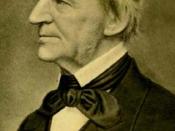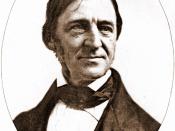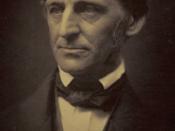Bartleby the Scrivener died of sadness, feeling trapped and completely without place in the programmed society that had developed around him. Furthermore, he fell victim to his own desire to resist the mindless description that characters like the narrator achieved so effortlessly. Bartleby's death plainly points to Melville's dissatisfied view of the modern world; a world where strength comes from weakness and flexibility, and where the naturally weak overpower the strong. In addition, to define Bartleby the Scrivener in such simple terms, however, is to ignore some important, specific themes that Melville cleverly shows with the characters in the story.
To Melville, the modern demanding society so accurately divides a person's responsibilities, it reduces the range of his ability to interact with himself, nature, and his community. Moreover, this belief closely follows that of Ralph Waldo Emerson, who judged modern self-moving society to be the downfall of humanity because it left individuals numb to the mixture of capabilities that they are naturally gifted with.
Melville's characters in Bartleby, the Scrivener are portrayed as "half-men" who are victims of a society which chokes their natural ability to feel and act according to their romantic role as an individual in society.
Bartleby and the narrator are two "half-men" who, together, should make a complete man. The narrator is flexible and adjustable, is well suited to his environment, and in touch with the details of his society and his duty. Although he is hardly an active person, he represents the lowest common denominator necessary to survive the modern society Melville describes. Romantics of the 19th century probably did not admire men for their ability to adapt and find safety and security at all costs. However, the ability to survive without imposing authoritarian values upon other people is certainly a romantic trait; one...



Bartleby
Interesting input on Bartleby, overall pretty good. Could expand a little more with more examples to back up your thesis. Good job concluding the essay.
1 out of 1 people found this comment useful.